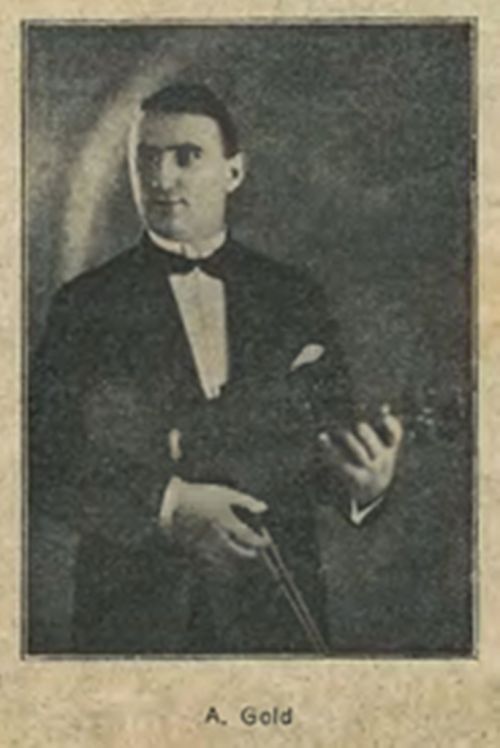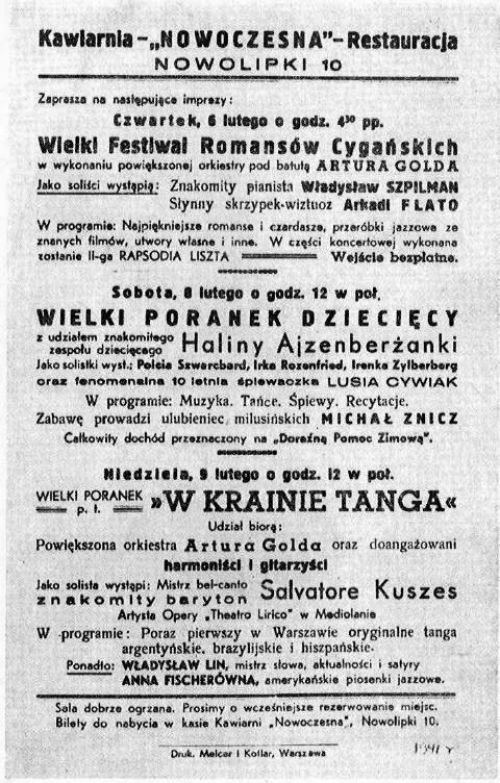Artur Gold

Artur Gold was born on March 17, 1897, in Warsaw, the son of Michal and Helena Gold. In 1922, he established a jazz band with his cousin Jerzy Petersburski, which became very popular. He traveled to England and recorded for Columbia Records in Hayes, Middlesex, near London. Back in Poland from 1929, he performed at the famous 'Adria' coffee house in Moniuszki Street 8, the most elegant and modern in Warsaw, for dancing and cabaret.
During the 1930's, he composed popular songs such as Jesienna rozy (Autumn Roses) and Oczy czarny (Eyes of Black). He lived and worked with his brothers Adam and Henryk, who were also musicians, at Chmielna Street 122, in Warsaw. In 1940, he was forced to move into the Warsaw Ghetto, where he performed at the Nowoczesna Cafe at Nowolipki Street 10, where also Wladyslaw Szpilman played daily on the piano. Szpilman's entire family was murdered in Treblinka.

Gold and Szpillman - Advert in the Gazetta Zydowska - (Holocaust Historical Society)
Artur Gold was deported from the Warsaw Ghetto to the Treblinka death camp in late 1942. He was recognized as a famous musician, and he was saved from the gas chambers and ordered by SS-Untersturmfuhrer Kurt Franz, to form a small orchestra. Richard Glazar, a Czech inmate in the camp recalled about the formation of the camp orchestra:
'We all knew that Lalka (Kurt Franz) was interested in music and someone alerted him to the fact that Artur Gold, the famous Warsaw musician, had arrived on one of the last transports. Lalka brought out Gold and gave him the assignment of forming a small orchestra in Treblinka. There were certainly enough musicians here, both of the red-haired Schermann's, Salwe, the tenor, little Edek with his accordion, and many others.'
Kurt Franz ordered the composition of the camp song titled 'Fester Schritt' - the lyrics were composed by Walter Hirsch, a Czech Jewish inmate, and Artur Gold wrote the music. Artur Gold perished during 1943.
Some of the survivors recalled Artur Gold's time in the Treblinka death camp:
Oskar Strawczynski takes up the story:
Gold assumed his work energetically. The Germans helped him. Quite a large number of musical instruments was left in the yard by the Jews when they went to the showers. Only jazz was missing. To rectify this, the Hauptsturmfuhrer Stangl brought back cymbals with him from his vacation... the drum was made in the camp. And in good time we also had ourselves a jazz band. One of the musicians who had come with Gold was an excellent jazz musician.
A mixed choir of men and women was also formed. A Jew from Czechoslovakia wrote the texts and Gold the melodies. He wrote wonderful compositions for his orchestra. To round it off, Jazik, who was a soloist and cabaret dancer, was also added to the orchestra.
By the order of Kurt Franz, white suits with blue collars and lapels were sewn for the people in the orchestra in the tailor shop. Gold appeared in a white frock coat with the same decorations, patent leather shoes, pressed pants
Samuel Willenberg recalled:
As we stood at roll-call, Gold entranced us with the old melodies he produced with his violin - amidst the sweet, nauseating stench of decomposing bodies which clung to us as if never wanting to part. The smell had become part of our very being; it was all that remained of our families and loved ones, a last remembrance of the Jewish people, exterminated in the gas chambers.......
After one of these concerts the Germans reached a conclusion the maestros did not look good. Their clothes were too big, held up by all kinds of belts, and their boots were high and heavy. They ordered our tailors to sew jackets of shiny, loud blue cloth, and to attach giant bow-ties to the collars. Dressed not as prisoners any longer, but as clowns, they entertained us after roll-call day in, day out. However spent we might be after a twelve-hour working day, we had to stand in rank and take in a concert.
Oskar Strawczynski remembered a particular celebration:
Gold celebrated his 40th birthday (Gold was in fact 46 years of age in 1943) with great pomp and ceremony. In the tailor shop, the tables were laden with the best of everything. The Treblinka bakery supplied pastries; the German warehouse supplied drinks and sweets. Gold arranged a special programme for the occasion. The hall was beautifully decorated and the orchestra was in gala attire. Special invitations were issued to all the Germans and the Jewish camp aristocracy.
Toasts were drunk to the German victory. Gold reached his peak with his oration in which he praised the Germans for their benevolence, and declared that their handling of the Jews was understandable and in the interests of the German people. I have no idea what the Germans could have thought of that speech. I only know that from that moment on, for me and for most of us, Gold lost all his charm and the trust he had commanded. We also lost our respect for his artistic abilities.
Richard Glazar recalled an off-duty event:
On a lovely Sunday afternoon we are all herded onto the assembly site in front of the boxing ring. The greenish black gentlemen sit down on chairs that have been set up in a half circle. The shorn heads, the bearers and loaders, tailors and shoemakers, carpenters and cabinet makers, cooks, and laundry maids, clerks, and accountants, supervisors, medics, grave-diggers - we all crowd in behind these gentlemen, surrounded by black mercenaries and riflemen. Treblinka is a world unto itself, isolated from the other world.
Artur Gold and his boys, all in white jackets with large blue lapels, open the festivities with a march. Captain Stangl is sitting in an easy chair in the middle of his men, tapping his foot and keeping time, gently beating the top of his boot with his riding whip. A flourish. First Salwe the singer steps up and presents an Italian tarantella. He is followed by Treblinka's newest acquisition, a cantor, supposedly the best in Warsaw, who was taken off one of the last transports.
Oskar Strawczynski recalled what happened in the evening after the daily whippings were carried out:
After settling the daily accounts, the bench and whip were removed to the storeroom. Gold steps up to the podium and the concert begins with some light classic like 'Cavaleria Rusticana' or something similar. After that the choir performs, and then the entire crowd sings 'Treblinka' until finally we hear the long awaited command 'Aptreten' (dismissed). We breathe a sigh of relief. Gold and his band move to the side and play a lively march . Block by block, we parade before the authorities, down to the kitchen for supper. You have to be extremely careful to keep in step, otherwise you will still get a few lashes over the head from Kiewe.
After supper, we have music again - this time in the tailor shop, the biggest and nicest hall in the ghetto. Outside, the sky around the camp turns red from the infernal flames of the huge, newly built oven. The wind carries the evil smell of burnt and rotting flesh and bones. It is impossible to breathe outside.
In the tailor shop, our aristocracy is gathered with their girlfriends. Some bored Germans and Wachmanner also come by. Our ladies and gentlemen dance to the lovely music of the well-rehearsed Gold orchestra, entertain each other, and get drunk... night after night. Later, in warmer weather the orchestra plays outside near the closed gates. On the other side of the gate, groups of Ukrainians present their folk dances. This is the daily picture of Treblinka. As mentioned earlier, we lacked only bread, we had more than enough music, lashes and death.
Sources
C Webb & M. Chocholaty, The Treblinka Death Camp, Second Edition Ibidem-
Y.Arad, Belzec, Sobibor, Treblinka, Indiana University Press, Bloomington 1987
Israel Cymlich, Oskar Strawczynski, Escaping Hell in Treblinka, Yad Vashem, Jerusalem 2007
Richard Glazar, Trap with a Green Fence, Northwestern University Press, Evanston, 1999
Samuel Willenberg, Surviving Treblinka, Basil Blackwell, Oxford 1989
Image: staremelodie.pl
Document: - Holocaust Historical Society
© Holocaust Historical Society, March 26, 2021

